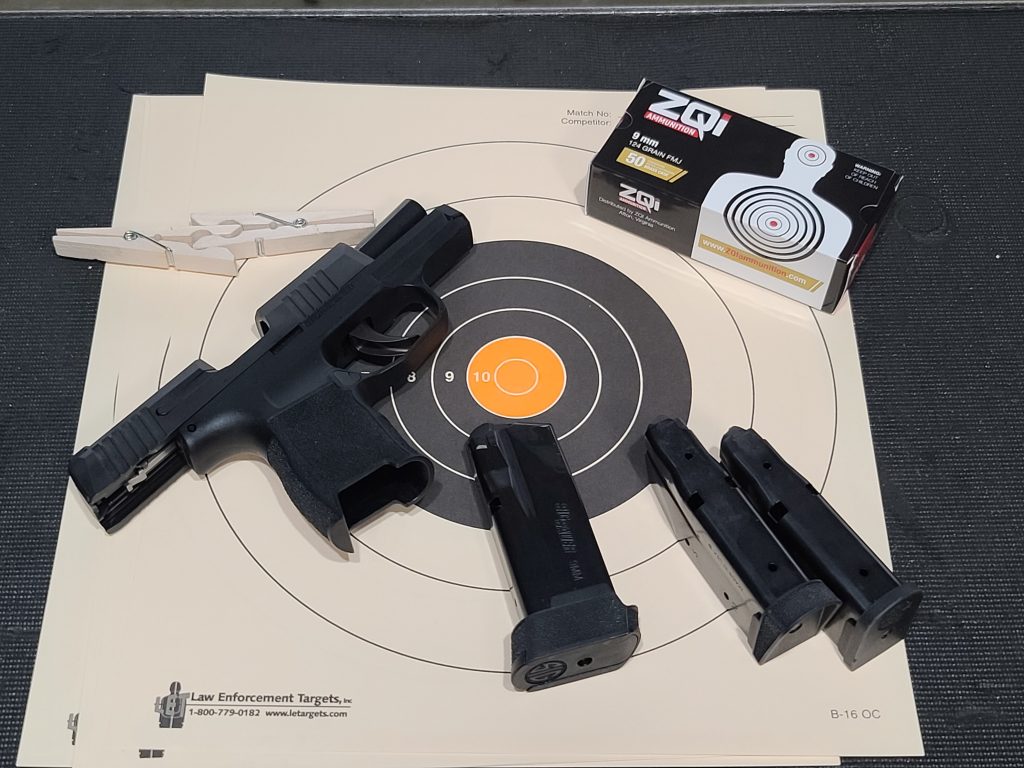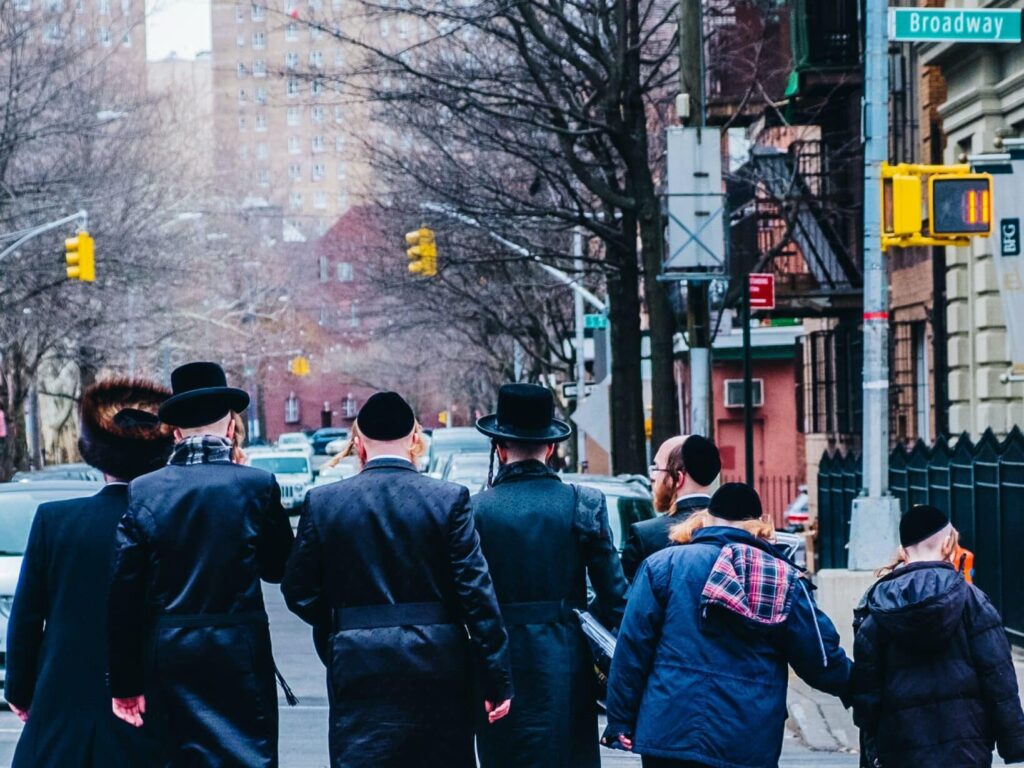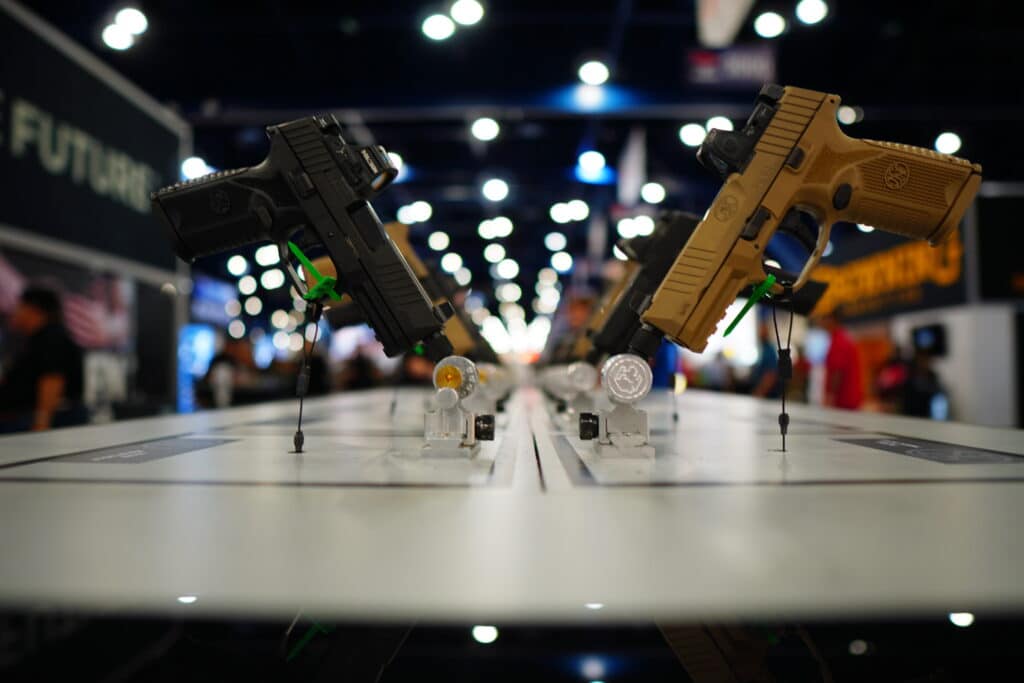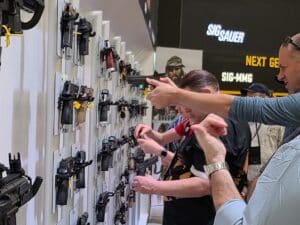Here we go. The election is in just two days, and the outcome will determine a lot about the future of gun politics in the United States.
So, we’re spending the final days laying out which races will be bellwethers for the state of guns in American politics. Contributing Writer Jake Fogleman takes a close look at the Oregon gun-control initiative and its uphill battle for passage. And I give a broad overview of what indicators will be most important to pay attention to as the election results come in.
Beyond the election, it remains important to watch the federal courts. We had a late-breaking story this week on a group of armed Jewish worshipers who want a judge to block enforcement of New York’s new synagogue gun ban after the FBI warned of a credible threat in the area.
Plus, Axios’s Josh Kraushaar tells me where he thinks guns will play a big role on the podcast.

Analysis: Oregon’s Gun-Control Initiative Faces Tough Fight [Member Exclusive]
By Jake Fogleman
Oregonians will have a chance to vote on one of the strictest gun-control laws in the nation on Tuesday. The ballot initiative faces an uphill battle, even in the deep blue state.
Measure 114 represents one of the most sweeping gun-control laws ever submitted directly to voters anywhere in the country. The measure aims to establish a new permit-to-purchase for all gun sales and ban the sale of some of the most popular ammunition magazines in the country.
The measure would require any resident who wishes to purchase a gun to first obtain a permit from their county sheriff, which they would have to renew every five years. To get the license, they would need to pay a $65 fee, complete a firearms safety course at their own expense, submit a photo ID, be fingerprinted, and pass a criminal background check. The measure would direct state law enforcement agencies to maintain a database of all permit-to-purchase applicant information, which would function as a de facto registry.
Additionally, residents would be prohibited from purchasing, using, transferring, or possessing ammunition magazines capable of holding more than ten rounds. Currently-owned magazines would be grandfathered only for use on private property and shooting ranges, making their continued use for public carry off-limits. Violations would be a class A misdemeanor offense.
Public polling on the measure has been limited, but the few that have been conducted show a divided electorate that appears to be shying away from the initiative. An Oregonian poll conducted in late September found a bare majority, 51 percent, of likely voters said they support the measure, with 39 percent opposed. Another 10 percent told the pollsters they were undecided.
A more recent poll from the Salem-based Nelson Research finds that 46.1 percent of likely voters support the measure, while 49.4 percent oppose it. Another 4.5 percent say they’re still undecided.
There are also broader structural factors that cast doubt on its prospects.
A Gallup poll released last week finds a steep decline in voters nationally who rate gun policy as an important electoral issue. Just 38 percent of registered voters now say gun policy is extremely important to their vote, down 17 points from June when the issue tied with the economy at the very top of voters’ lists. The issue now trails the economy, abortion, and crime among registered voters’ list of priorities.
Furthermore, Republicans are actually five percentage points more likely to list it as extremely important than Democrats. That, on its face, would seem to bode poorly for measure 114 in Oregon. All things being equal, Republican voters tend to favor less restrictive gun laws.
The state is also contending with a bit of a groundswell of support for right-of-center politics more generally after decades of Democratic hegemony. Even though Oregon voters have not elected a Republican Governor since 1982, Republican Christine Drazan has been consistently leading in the polls over her Democratic opponent for the last couple of months, thanks in part to a competitive independent run by a disgruntled Democrat. That could indicate that the state’s voters have soured a bit on Democratic voting priorities.
The history of ballot box gun-control measures also casts doubt on Measure 114.
In 2016, voters in Nevada voted on a universal background check initiative. While voters approved the measure, it barely survived, passing by about half a percentage point. That’s despite universal background checks routinely polling above 85 percent support in most national public opinion polls.
That same year Maine voted on the same issue. They voted to reject the measure by a four percent margin. And that was in the same election where voters broke for Hillary Clinton (D.) over Donald Trump (R.) by about three percentage points.
The narrow passage of universal background checks in Nevada, and the outright defeat in Maine, call into question the viability of a far more comprehensive and restrictive measure in Oregon.
However, Oregon is much more Democratic than Nevada or Maine. Its deep blue politics could be a force to counteract the trend of underwhelming results for other ballot initiatives.
But Democrats aren’t wholly united in support of the policy either. Some progressive criminal justice reform advocates have voiced concern that Measure 114 would give law enforcement over who can buy a gun.
“The best world is the world in which almost no one has a gun,” Athul Acharya, executive director of the civil rights organization Public Accountability, told Portland Mercury. “The worst world is one in which the Proud Boys and Patriot Prayer have guns, and no one else has a gun. This measure, I think, gets us closer to that world.”
“Given the undisputed bias of police against folks who are BIPOC, poor, part of the LGBTQ2SIA+ community, and/or have leftist politics, Measure 114 would be a nightmare for all of these groups,” another resident told the outlet.
Other progressive activists have contended that the measure’s ban on ammunition magazines would be enforced disproportionately against minorities.
“That (Measure 114) is in effect a hunting license for police to search for things, to arrest people who have them, to put them through the court system,” Graham Parks, a Portland resident and Oregon State Democratic Party Central Committee member, told a local Fox affiliate.
Of course, there’s still a distinct possibility that the measure will pass on Tuesday. The state’s default political landscape would seem to lend itself to the measure passing, and spending has trended significantly in its favor. Supporters of 114 have outspent opponents $2.3 million to $131,000 as of November 4th.
But to pass, it will have to overcome a coalition of opposition consisting of progressive criminal justice advocates, gun-rights proponents, and voters swayed by a good year for conservative politics more broadly. It will also have to depart from a recent trend of gun-control ballot measures underperforming polling.
Podcast: Axios’s Josh Kraushaar on Guns and the Midterms [Member Early Access]
By Stephen Gutowski
The midterm elections are upon us.
As we’ve discussed previously, Americans are far less interested in gun policy than they were this summer. So, how will we be able to tell the effects of guns on the election? Axios Senior Political Correspondent Josh Kraushaar joins the show to talk about where we should focus our attention.
There are a few races where guns are playing a more prominent role. The ballot initiatives in Iowa and Oregon that deal directly with gun policy are obvious examples. The gubernatorial races in Texas, Georgia, and New York are other races where guns are having a significant impact.
But Kraushaar said overall control of Congress will be a really important tell because of how polarized gun politics have become. If Republicans win, it’ll be a good sign for gun-rights proponents. If Democrats win, it’ll be a good sign for gun-control advocates. It’s that simple.
Plus, Contributing Writer Jake Fogleman and I talk about Beto O’Rourke’s struggle in Texas and Brady’s new spending in two House races.
You can listen to the show on your favorite podcasting app or by clicking here. Video of the show is also available on our YouTube channel. Members get early access on Sunday. The show goes public for everyone else on Monday.
Come on the Podcast
One of the many perks of a Reload membership is the opportunity to appear on the podcast. We’ve had a lot of people on the show from all kinds of backgrounds. It’s one of my favorite segments since it gives us all a better insight into the community that makes this publication possible. If you want to come on the show, just reply to this email and let me know!

Jewish Group Urges Federal Judge to Block New York’s Synagogue Gun Ban as FBI Warns of Increased Threats
By Stephen Gutowski
As a threat of violence hangs over their heads, a group of Jewish gun owners in New York is asking a federal judge to allow them to carry guns in their places of worship.
Plaintiffs in Goldstein v. Hochul, backed by the NY State Jewish Gun Club, sent a letter on Thursday to federal judge Vernon Broderick of New York’s southern district, an Obama appointee, asking him to issue a preliminary injunction against the state’s new gun-carry law. The group is challenging a provision that bars everyone, including those with valid licenses, from carrying a gun at any place of worship inside the state. It said the FBI’s recent warning of credible threats against synagogues in neighboring New Jersey was further evidence Judge Broderick needs to issue an order against the ban immediately.
“The absence of a decision in this matter means that plaintiffs can neither exercise their fundamental right to self-defense in “places of worship or religious observation” nor seek review and redress from the Second Circuit to allow them to do so,” Ameer Benno, a lawyer for the plaintiffs, said. “This has real-world consequences. Hours ago, the Federal Bureau of Investigation (“FBI”) released a bulletin that it had received ‘credible information of a broad threat to synagogues’ in New Jersey.”
The FBI reported they had identified the source of the threats on Friday and verified there was no longer a “danger to the community.” But the group said the warning, coupled with the rising rate of violent crimes targeting Jews in the state, demands action from Judge Vernon.
“The Southern District Court still has not made a decision as to whether to enjoin the law that the NYPD and the AG say will be enforced while the FBI reports antisemitic activity in an area where Jews were targeted and killed previously,” Cory Morris, another lawyer for the plaintiffs, told The Reload. “Our clients have to choose between being felons or losing their faith every minute this Court fails to act.”
Lawmakers passed New York’s latest gun-carry regime in response to the Supreme Court striking down the state’s previous law as unconstitutional. State lawmakers promoted it as a rebuke to the Court, but judges have blocked significant portions in two separate federal cases. The places of worship restriction, which is the strictest example in the country, has been found unconstitutional by both federal judges. Judge Glenn Suddaby of the Northern District of New York issued a temporary restraining order in early October against most of the law’s controversial provisions, including the church and synagogue ban. Judge John Sinatra of the Western District of New York issued a preliminary injunction on Thursday that extended his previous temporary restraining order blocking the state from enforcing its places of worship gun-carry ban.
However, the Second Circuit Court of Appeals has stayed Suddaby’s order pending an appeal from the state. New York City and the state have also contended they can still enforce the provision in New York’s southern district despite the ruling in the western district. That means Judge Broderick will have to weigh in on the validity of the state’s ban. His decision will determine whether Jewish worshipers, or those of any other faith, will be allowed to carry guns to defend themselves during services legally. Benno argued the timeframe of that decision would matter a great deal as well.
“Shakespeare stated that ‘delays have dangerous ends,’” he wrote in his letter to Judge Broderick. “The longer this drags on, the more lives are being placed in grave jeopardy. The Western District understood this and acted expeditiously. We urge this Court to do the same.”
Benno said some Jewish worshipers want to arm themselves to prepare for possible attacks, especially in the wake of the recent FBI warning. However, New York has removed any avenue for doing so without breaking the law.
“While the FBI has asked that the threatened areas’ take all security precautions’ to protect their communities and facilities, and while the Ramapo Police Department has asked ‘that Houses of Worship increase their security posture,’ New York State’s categorical prohibitions on firearm possession in places of worship or religious observation make doing so impossible,” he wrote in the letter.
Morris noted the case sits at the intersection of the First and Second Amendments.
“New York made religious observation while carrying a legal firearm a felony,” he told The Reload. “The law, created in an irrational response to a Supreme Court decision, now disarms Jews as they prepare to engage in religious observation, the sabbath, among other things.”

Analysis: The Races That Will Tell Us About the State of American Gun Politics [Member Exclusive]
By Stephen Gutowski
Election Day is coming up on Tuesday, and it will go a long way toward determining the future of guns in America. But some races will provide much more insight than others.
While the general public’s attention has turned away from guns as a top issue, it is far more important in a number of key races across the country. Those races will tell us what there is to know about how gun politics are playing and how they may play out during the 2024 presidential election and beyond.
Ballot Initiatives
The easiest indicators to read will be with the two state-level ballot initiatives focused on gun policy. They are, of course, the ultimate poll of voters on where they stand on guns—no need to consult an Oracle to interpret what an outcome means.
In Iowa, there is an initiative to add the “right to keep and bear arms” to the state constitution and instruct judges to use strict scrutiny when reviewing gun laws. It has polled well and appears likely to pass.
In Oregon, Measure 114 would ban the sale of magazines that hold more than ten rounds and institute a permit to purchase system alongside training requirements and a fee. The polling on that measure has been closer. The latest poll shows that more voters oppose the initiative than support it.
Gubernatorial elections
As far as races between candidates go, the most prominent ones that have put guns front and center have all been for governor. It will also be fairly easy to read the tea leaves from how these elections turn out, given how much contrast there is between the Democrats and Republicans in these races.
In Texas, Democrat Beto O’Rourke is working to unseat incumbent Republican Greg Abbott. O’Rourke is best known for his call to confiscate AR-15s and AK-47s, which he has stuck with despite some flip-flopping. Abbott, on the other hand, just signed permitless gun-carry into law. O’Rourke has kept guns front and center in the race, especially in the wake of the Uvalde school shooting, but has faded significantly in polls as of late.
In Georgia, the story is much the same. Democrat Stacey Abrams is taking on incumbent Republican Brian Kemp in a rematch. She has heavily criticized Kemp’s decision to sign permitless gun-carry into law as well. And she too has struggled to close the polling gap between her and Kemp.
In New York, there may be a surprise upset brewing. Republican challenger Lee Zeldin is trying to unseat Democrat Kathy Hochul. The latter has attempted to elevate gun control as a key issue in an effort to forestall her slide in the polls. Zeldin has focused chiefly on crime and economic issues but has also critiqued Hochul for passing a bill in response to the Supreme Court striking down the state’s previous gun-carry regime that multiple federal judges have already struck down. The latest poll shows him pulling ahead just days before the election.
Gun Group Endorsements
How many of the candidates endorsed by the NRA and Everytown win will tell us which side had a better night. Although, it probably won’t give as much insight as you might expect at first glance. That’s because the increasing polarization of the gun issue has led to the gun groups’ endorsements becoming increasingly polarized.
So, the way things go for the NRA and Everytown will likely closely mirror the way things go for Republicans and Democrats generally. The main difference is that the gun groups can, and do, avoid endorsing candidates in races they don’t believe they’re likely to win.
What will be more revealing is how candidates perform in the races each side is focusing their spending on. Many of those are the same races. Both sides have spent significantly on key Senate races in Arizona, Wisconsin, Georgia, Nevada, North Carolina, and Pennsylvania. But there are a few key House and state legislature races that the gun-control groups have spent in, though not all of those will tell us something about gun politics.
Control of Congress
The last thing to watch for is who ultimately wins control of Congress. Polarization plays an obvious role here as well. Republicans are generally pro-gun, and Democrats are generally pro-gun-control. So, the way they perform will tell us something about the appeal of each position.
But there’s a more sophisticated read of the outcome as well. Republicans in Congress, especially in the Senate, gambled that passing the bipartisan gun bill over the summer would do enough to placate suburban voters in the wake of Uvalde to keep it off the top of their minds. Democrats went the other way and passed an AR-15 ban through the House in hopes of making guns a top campaign issue.
The polling indicates Republicans have gotten the better of those bets. But the election is, of course, the poll that has the final say.
But the raw outcome isn’t all that matters. Perception plays a huge role in all of this as well.
It’s one thing for incumbents such as Brian Kemp, Kathy Hochul, or Greg Abbott to beat their challengers. That’s what they’re expected to do. But if they lose in a surprise upset or win in a surprising landslide, it will have a big impact on whether their strategy on guns is viewed as a stunning success or a shocking failure.
As the results pour in for these key races, consider not just who won and lost but also by how much and how the results compare to the expectations.
That’s it for now.
I’ll talk to you all again soon.
Thanks,
Stephen Gutowski
Founder
The Reload






